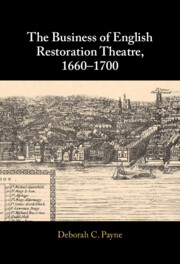The Business of English Restoration Theatre, 1660–1700
Deborah C. Payne’s groundbreaking study traces the historical origins of a dilemma still bedeviling theatre companies: how to reconcile audience demand for novelty with profitability. As a solution, English acting companies in 1660 adopted an unprecedented theatrical duopoly. Implicit in its economic logic were scarcity, prestige, and innovation: attributes that, it was hoped, would generate wealth and exclusivity. Changes to playhouse architecture, stagecraft, dramatic repertory, and company practices were undertaken to create this new, upmarket theatre of “great expences.” So powerful was the promise of the duopoly and so enthralling the wholesale transformation of the theatrical marketplace that management – despite dwindling box office receipts – resisted change for thirty-five years. Drawing upon network and behavioral economic theory, Professor Payne shows why the acting companies clung to an economic model inimical to their self-interest. Original archival research further bolsters this radically new perspective on an exciting and crucial period in English theatre. This title is also available as Open Access on Cambridge Core.
Deborah C. Payne is Professor of Literature at American University, Washington, D.C. Her previous publications include: The Cambridge Companion to English Restoration Theatre (2000); Four Restoration Libertine Plays (2005); Revisiting Shakespeare’s Lost Play: Cardenio/Double Falsehood in the Eighteenth Century (2016); and, with Drew Lichtenburg, Shakespeare Theatre Company (2024). Professor Payne also works as a dramaturgical consultant in Washington, D.C.

